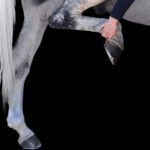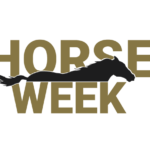Friday the 13th reared its ugly head today at the World Equestrian Games, but even some mishaps couldn’t derail American efforts in the dressage Grand Prix Special on the heels of the team’s silver medal triumph yesterday.
Debbie McDonald held her third place in the individual medal rankings, despite a stumble behind from her partner, Brentina. Debbie’s teammate, Lisa Wilcox, had more serious problems, with too strong a rein shutting down Relevant as he was going into a pirouette. His tendency to get off-balance in the piaffe surfaced again as it did in the Grand Prix, spoiling an otherwise graceful test.
Those of us who were watching and hoping for Debbie jolted out of our chairs as her chestnut mare tripped along the diagonal, perhaps because she caught a shoe. Brentina broke into a few steps of canter from the extended trot and then came back to her rider.
“I went, `Oh,—-,'” Debbie said. “Then I had to really concentrate. I knew I could do this and I knew she could do it.”
The judges, apparently realizing accidents do happen even to the best, gave Brentina 76.120 percent. When she heard her score announced, Debbie recalled, “Oh my God, I nearly passed out and started weeping like a baby.”
“A lesser rider might have folded,” U.S. Equestrian Team President Armand Leone Jr., said, citing Debbie’s ability not only to keep going, but to do it well. He was happy that the judges didn’t penalize her too heavily, believing that “knowing the rider, they recognized the test for what it was.”
Debbie was not far behind the winner of the Special, Spain’s Beatriz Ferrer-Salat, who had no mistakes with Beauvalais to be marked at 77 percent. Her mount was particularly good in the passage and extended trot, which appear early and often in the Special. But the Hanoverian gelding didn’t seem to me to have great flash or exuberance, and his piaffe was certainly dull. Still, it was a big win for the home side, which is really feeling its oats here. The crowd let out a long, deafening roar for their heroine after her score was announced, as Spain trumped the rest of the dressage world — at least for one afternoon.
Lisa blamed Relevant’s misfortunes on her riding, saying she was “disgusted.” Her mistakes were more costly than Debbie’s and while 75.680 was good enough for fourth, you couldn’t help but wonder what would have happened to the top placing if Relevant were errorless.
Going into Sunday’s dressage finale, the musical freestyle under the lights scheduled to end shortly before midnight, Nadine Capellmann of Germany tops the scoreboard overall with Farbenfroh (153.840), who was third in the Special with 75.880 after mistakes in his two-tempis. His rider seemed to be pushing to get something out of him in the last piaffe.
Beatriz (151.560) is second overall, while Debbie is third on 150.76 and Lisa fourth with 149.880. Rusty, with European Champion Ulla Salzgeber of Germany up, lacked luster, perhaps due to a fever he suffered early in the week. He missed on the one-tempis and overspun a pirouette.
The Americans are still on a high from their team dressage silver, and were planning their second party to celebrate the historic occasion for this evening.
By the way, I miswrote yesterday when I said the USA’s 1992 bronze in Barcelona was the first post-World War II open championships dressage medal for the team. America also got a bronze in 1976, but then had a 16-year drought before its breakthrough in Spain a decade ago. Of course I remember the 1976 bronze, but I was typing a little too fast. What I MEANT to say was that Barcelona started a bronze medal streak for the U.S., broken only by a medal-less 1998 WEG. I don’t think I’ll get a chance to write about how the silver medal streak started here, however, as there’s no doubt the U.S. is gunning for gold and looks like it has a good chance of getting there.
Meanwhile, the American team dropped from first to second in the eventing standings after favored Britain took over the lead following the completion of the dressage phase. The margin is only 1.2 penalties, however.
There were great expectations for the USA’s Kim Vinoski with Winsome Adante, last to go in the competition. But the Rolex-Kentucky winning gelding became a bit of a firecracker in the ring, a Dr. Jekyll and Mr. Horse who was transformed by the atmosphere after working well in his warm-up away from the crowd.
“Tomorrow is a whole new deal,” Coach Mark Phillips said comfortingly as he greeted the disappointed Kim. David O’Connor added helpfully, “It could have been a lot worse than that.” And it was for defending World Champion Blyth Tait of New Zealand. His Ready Teddy, on whom he won the individual Olympic gold in the 1996 Olympics, was doing his own thing while Blyth tried to interest him in the test. Blyth wound up with a 50-penalty score and New Zealand stands eighth, 37 points off the leader.
Kim’s horse was not as bad as Blyth’s, but he broke several times and she said, “I tried to keep my leg off and not press him. He was just really tense.”
She tied on 43.4 penalties with teammate Amy Tryon, who went earlier in the day aboard Poggio II. The big news of the day in eventing dressage, however, was the amazing performance of Germany’s Bettina Hoy (yes, she’s married to Australian eventing star Andrew Hoy) as she scored an unbelievable 20.8 penalties on Woodsides Ashby to lead the rider rankings. Bettina got 10s for her position, and someone next to me remarked “she belongs in the other ring,” referring to the Grand Prix dressage in the main stadium.
Her score put Germany in a threatening position in third place, 0.60 back of the U.S., while Australia is just 0.4 penalties behind Germany. So it’s looking like a close race, but anything can happen, since rain is predicted for cross-country day. A downpour could make water-starved ground slippery along a course that already has the riders worried.
We’re up early tomorrow and off to Garrapilos, the site of cross-country, endurance and the driving marathon, about a half-hour from the main stadium.
I’m writing this on the bus to the press hotel, an hour from Jerez in Chiclana. Adding an extra two hours for back-and-forth to an already endless day-night cycle of work hasn’t pleased the media, but folks generally have stopped whining about it. The Brits on the bus, showing the same pluck that helped them win a war or two, just broke into a chorus of “It’s a Long Way to Chiclana,” (to the tune of “It’s a Long Way to Tipperary.”)





